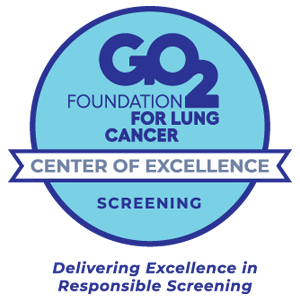Lung Cancer Screening

Catching lung cancer early improves your odds of survival. But the condition often shows no symptoms at first. That’s why a Low-Dose CT lung cancer screening at Owensboro Health is the best way to detect the disease in its initial stages—when treatment works best.
Ask your doctor or provider if Low-Dose CT Lung Screening might benefit your health or call our nurse helpline at 270-417-7641 to learn more.
Is the screening right for me?
You qualify for a Low-Dose CT lung cancer screening at Owensboro Health if you’re at high risk for lung cancer.
High-risk criteria
- You currently smoke or quit within the past 15 years
- You have a smoking history of at least 20 pack years (meaning you smoked an average of one pack of cigarettes per day for 20
years, or two packs a day for 10 years) - You are 50 to 80 years old
The screening is for people who aren’t experiencing lung cancer symptoms. See your primary care provider if you notice potential signs of lung cancer, including frequent coughing, recurrent bronchitis, coughing up blood and shortness of breath.
Request a Lung Screening
Lung cancer often doesn't show symptoms in its initial stages. That's why you may benefit from a low-dose CT lung screening that helps detect the disease early, when treatment works best.
Fill out the form below or call 270-417-7641.
Experts in lung cancer screening
We are accredited by the American College of Radiology to perform CT lung cancer screenings at the Healthpark and our three Healthplexes (located in Henderson, Madisonville and Powderly, Kentucky). Owensboro Health Twin Lakes Medical Center and Owensboro Health Muhlenberg Community Hospital also provide CT lung cancer screenings. You can rest assured that you and your family members will receive excellent care with our dedicated nurse navigators and multidisciplinary team approach.
Get the screening
FAQs
What can I expect during the screening?
During the low-dose CT lung cancer screening, you’ll lie still on your back on a long table. The table will slowly move through a round machine that takes pictures of your lungs. You won’t feel any pain, and the scan will take less than a minute.
What does a screening cost?
The maximum out-of-pocket cost for a low-dose CT lung cancer screening at Owensboro Health is $99.
Following a CT lung cancer
Does the screening involve risks?
You’ll be exposed to some radiation during the lung cancer screening, but less than during a typical CT scan. As with any screening, you also face the possibility of a false positive—a test result that incorrectly suggests you may have a disease. Follow-up diagnostic tests either confirm or disprove a positive screening result.
What happens after the screening?
If the results of your low-dose CT scan reveal nothing unusual, schedule another screening in a year. But if the screening shows something abnormal in your lungs, a medical professional will notify you and your primary care provider. You’ll find out whether you’d benefit from more testing, such as additional imaging or a biopsy.